#American War
Photo

Engagement Between the Bonhomme Richard and the Serapis off Flamborough Head, 1779 by Richard Willis
#Richard Willis#ships#sailing#sail ship#sea#meer#wasser#cloudy#boats#american war#ship#yorkshire#watercolour#art#painting#serapis#bonhomme#sun
18 notes
·
View notes
Quote
You fight the war with guns. You fight the peace with stories.
Omar El Akkad, American War
2 notes
·
View notes
Text
No book has ever hurt me as much as American War by Omar El Akkad, I’ve written two essays on it and just thinking about it for .2 seconds will make tear up… highly recommend
#I’ve been getting more traffic on my page so might as well give y’all a book recommendation 🤪#Omar el Akkad#American war#cli-fi#climate fiction#i just got one of my essays back and now I’m sad#got an A+ on it tho lmao#I’m actually quite proud of it#if you see this and want to read it I will provide a list of trigger warnings bc there’s a lot 😬#but it’s not gratuitous#it’s to show the horrors of war not for like… creepy reasons or plot
2 notes
·
View notes
Text

like to charge reblog to cast
#yemen#jerusalem#tel aviv#current events#palestine#free palestine#gaza#free gaza#news on gaza#palestine news#news update#war news#war on gaza#end the occupation#end the apartheid#apartheid#settler colonialism#american imperialism
57K notes
·
View notes
Text
17/12/23 this masterlist has been completely, vetted, revamped and reformatted with free access to all reading and viewing material. It will be updated and edited periodically so please try and reblog the original post if you're able.
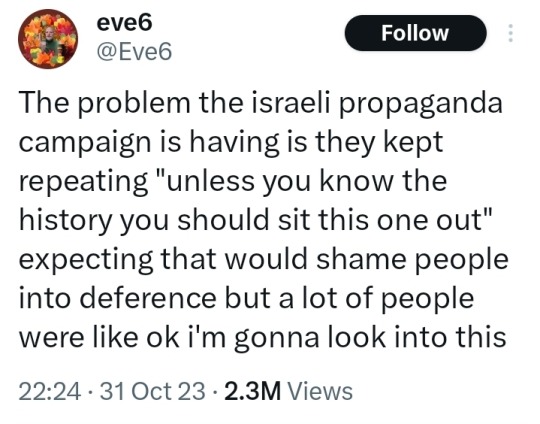
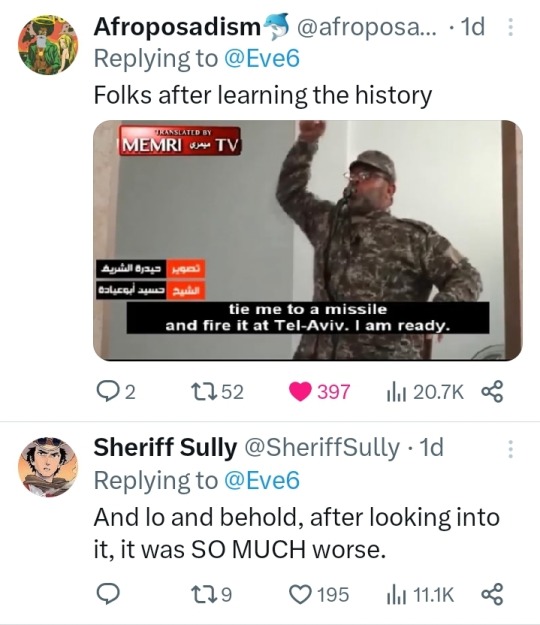

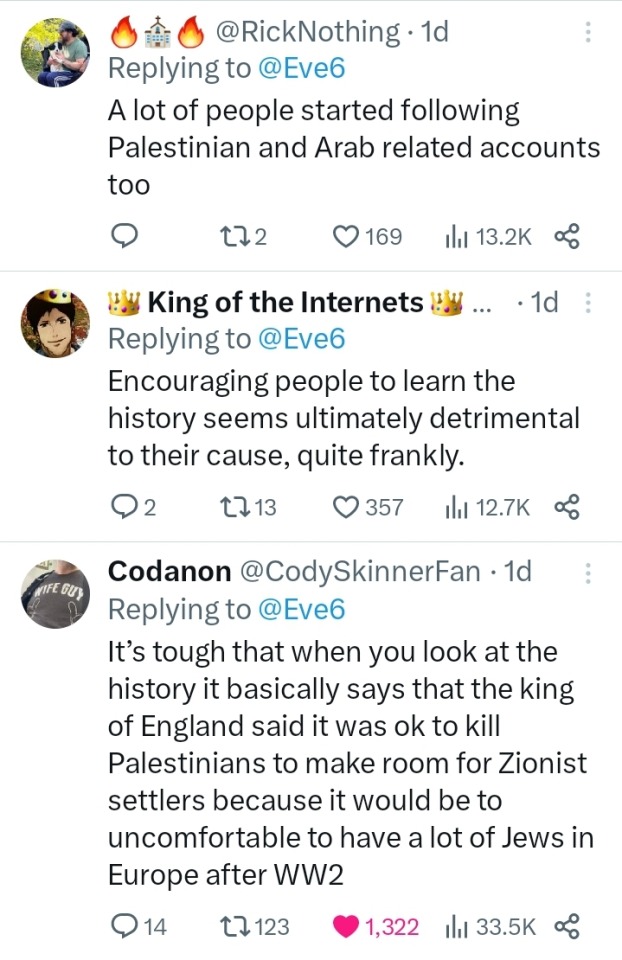
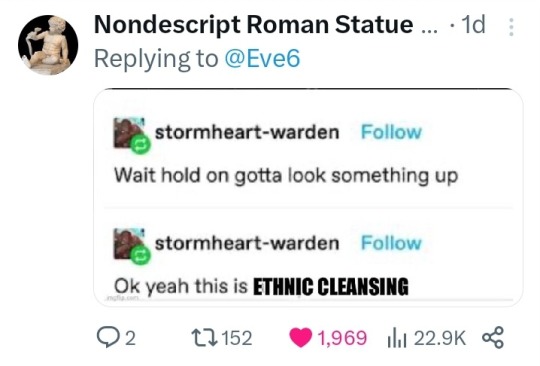
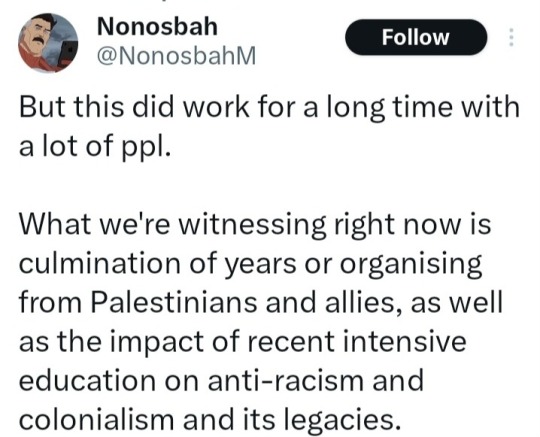
The Big Damn List Of Stuff They Said You Didn't Know
(Yes, it's a lot. Just choose your preferred medium and then pick one.)
Podcasts
Backgrounders and Quick Facts
Interactive Maps
Teach-Out Resources
Reading Material (free)
Films and Documentaries (free)
Non-Governmental Organizations
Social Media
How You Can Help
Podcasts
Cocktails & Capitalism: The Story of Palestine Part 1, Part 3
It Could Happen Here: The Cheapest Land is Bought with Blood, Part 2, The Balfour Declaration
Citations Needed: Media narratives and consent manufacturing around Israel-Palestine and the Gaza Siege
The Deprogram: Free Palestine, ft. decolonizatepalestine.com.
Backgrounders and Quick Facts
The Palestine Academy: Palestine 101
Institute for Middle East Understanding: Explainers and Quick Facts
Interactive Maps
Visualizing Palestine
Teach-Out Resources
1) Cambridge UCU and Pal Society
Palestine 101
Intro to Palestine Film + Art + Literature
Resources for Organising and Facilitating)
2) The Jadaliya YouTube Channel of the Arab Studies Institute
Gaza in Context Teach-in series
War on Palestine podcast
Updates and Discussions of news with co-editors Noura Erakat and Mouin Rabbani.
3) The Palestine Directory
History (virtual tours, digital archives, The Palestine Oral History Project, Documenting Palestine, Queering Palestine)
Cultural History (Palestine Open Maps, Overdue Books Zine, Palestine Poster Project)
Contemporary Voices in the Arts
Get Involved: NGOs and campaigns to help and support.
3) PalQuest Interactive Encyclopedia of the Palestine Question.
4) The Palestine Remix by Al Jazeera
Books and Articles
Free reading material
My Gdrive of Palestine/Decolonization Literature (nearly all the books recommended below + books from other recommended lists)
Five free eBooks by Verso
Three Free eBooks on Palestine by Haymarket
LGBT Activist Scott Long's Google Drive of Palestine Freedom Struggle Resources
Recommended Reading List
Academic Books
Edward Said (1979) The Question of Palestine, Random House
Ilan Pappé (2002)(ed) The Israel/Palestine Question, Routledge
Ilan Pappé (2006) The Ethnic Cleansing of Palestine, OneWorld Publications
Ilan Pappé (2011) The Forgotten Palestinians: A History of the Palestinians in Israel, Yale University Press
Ilan Pappé (2015) The Idea of Israel: A History of Power and Knowledge, Verso Books
Ilan Pappé (2017) The Biggest Prison On Earth: A History Of The Occupied Territories, OneWorld Publications
Ilan Pappé (2022) A History of Modern Palestine, Cambridge University Press
Rosemary Sayigh (2007) The Palestinians: From Peasants to Revolutionaries, Bloomsbury
Andrew Ross (2019) Stone Men: the Palestinians who Built Israel, Verso Books
Rashid Khalidi (2020) The Hundred Years’ War on Palestine: A History of Settler Colonialism and Resistance 1917–2017
Ariella Azoulay (2011) From Palestine to Israel: A Photographic Record of Destruction and State Formation, 1947-1950, Pluto Press
Ariella Azoulay and Adi Ophir (2012) The One-State Condition: Occupation and Democracy in Israel/Palestine, Stanford University Press.
Jeff Halper (2010) An Israeli in Palestine: Resisting Dispossession, Redeeming Israel, Pluto Press
Jeff Halper (2015) War Against the People: Israel, the Palestinians and Global Pacification
Jeff Halper (2021) Decolonizing Israel, Liberating Palestine: Zionism, Settler Colonialism, and the Case for One Democratic State, Pluto Press
Anthony Loewenstein (2023) The Palestine Laboratory: How Israel exports the Technology of Occupation around the World
Noura Erakat (2019) Justice for Some: Law and the Question of Palestine, Stanford University Press
Neve Gordon (2008) Israel’s Occupation, University of California Press
Joseph Massad (2006) The Persistence of the Palestinian Question: Essays on Zionism and the Palestinians, Routledge
Memoirs
Edward Said (1986) After the Last Sky: Palestine Lives, Columbia University PEdward Saidress
Edward Said (2000) Out of Place; A Memoir, First Vintage Books
Mourid Barghouti (2005) I saw Ramallah, Bloomsbury
Hatim Kanaaneh (2008) A Doctor in Galilee: The Life and Struggle of a Palestinian in Israel, Pluto Press
Raja Shehadeh (2008) Palestinian Walks: Into a Vanishing Landscape, Profile Books
Ghada Karmi (2009) In Search of Fatima: A Palestinian Story, Verso Books
Vittorio Arrigoni (2010) Gaza Stay Human, Kube Publishing
Ramzy Baroud (2010) My Father Was a Freedom Fighter: Gaza's Untold Story, Pluto Press
Izzeldin Abuelaish (2011) I Shall Not Hate: A Gaza Doctor’s Journey on the Road to Peace and Human Dignity, Bloomsbury
Atef Abu Saif (2015) The Drone Eats with Me: A Gaza Diary, Beacon Press
Anthologies
Voices from Gaza - Insaniyyat (The Society of Palestinian Anthropologists)
Letters From Gaza • Protean Magazine
Salma Khadra Jayyusi (1992) Anthology of Modern Palestinian Literature, Columbia University Press
ASHTAR Theatre (2010) The Gaza Monologues
Refaat Alreer (ed) (2014) Gaza Writes Back, Just World Books
Refaat Alreer, Laila El-Haddad (eds) (2015) Gaza Unsilenced, Just World Books
Cate Malek and Mateo Hoke (eds)(2015) Palestine Speaks: Narrative of Life under Occupation, Verso Books
Jehad Abusalim, Jennifer Bing (eds) (2022) Light in Gaza: Writings Born of Fire, Haymarket Books
Short Story Collections
Ghassan Kanafani, Hilary Kilpatrick (trans) (1968) Men in the Sun and Other Palestinian Stories, Lynne Rienner Publishers
Ghassan Kanafani, Barbara Harlow, Karen E. Riley (trans) (2000) Palestine’s Children: Returning to Haifa and Other Stories, Lynne Rienner Publishers
Atef Abu Saif (2014) The Book of Gaza: A City in Short Fiction, Comma Press
Samira Azzam, Ranya Abdelrahman (trans) (2022) Out Of Time: The Collected Short Stories of Samira Azzam
Sonia Sulaiman (2023) Muneera and the Moon; Stories Inspired by Palestinian Folklore
Essay Collections
Edward W. Said (2000) Reflections on Exile and Other Essays, Harvard University Press
Salim Tamari (2008) Mountain against the Sea: Essays on Palestinian Society and Culture, University of California Press
Fatma Kassem (2011) Palestinian Women: Narratives, histories and gendered memory, Bloombsbury
Ramzy Baroud (2019) These Chains Will Be Broken: Palestinian Stories of Struggle and Defiance in Israeli Prisons, Clarity Press
Novels
Sahar Khalifeh (1976) Wild Thorns, Saqi Books
Liyana Badr (1993) A Balcony over the Fakihani, Interlink Books
Hala Alyan (2017) Salt Houses, Harper Books
Susan Abulhawa (2011) Mornings in Jenin, Bloomsbury
Susan Abulhawa (2020) Against the Loveless World, Bloomsbury
Graphic novels
Joe Sacco (2001) Palestine
Joe Sacco (2010) Footnotes in Gaza
Naji al-Ali (2009) A Child in Palestine, Verso Books
Mohammad Sabaaneh (2021) Power Born of Dreams: My Story is Palestine, Street Noise Book*
Poetry
Fady Joudah (2008) The Earth in the Attic, Sheridan Books,
Ghassan Zaqtan, Fady Joudah (trans) (2012) Like a Straw Bird It Follows Me and Other Poems, Yale University Press
Hala Alyan (2013) Atrium: Poems, Three Rooms Press*
Mohammed El-Kurd (2021) Rifqa, Haymarket Books
Mosab Abu Toha (2022) Things You May Find Hidden in My Ear: Poems from Gaza, City Lights Publishers
Tawfiq Zayyad (2023) We Are Here to Stay, Smokestack Books*
The Works of Mahmoud Darwish
Poems
Rafeef Ziadah (2011) We Teach Life, Sir
Nasser Rabah (2022) In the Endless War
Refaat Alareer (2011) If I Must Die
Hiba Abu Nada (2023) I Grant You Refuge/ Not Just Passing
[All books except the ones starred are available in my gdrive. I'm adding more each day. But please try and buy whatever you're able or borrow from the library. Most should be available in the discounted Free Palestine Reading List by Pluto Press, Verso and Haymarket Books.]
Human Rights Reports & Documents
Information on current International Court of Justice case on ‘Legal Consequences arising from the Policies and Practices of Israel in the Occupied Palestinian Territory, including East Jerusalem’
UN Commission of Inquiry Report 2022
UN Special Rapporteur Report on Apartheid 2022
Amnesty International Report on Apartheid 2022
Human Rights Watch Report on Apartheid 2021
Report of the United Nations Fact-Finding Mission on the Gaza Conflict’ 2009 (‘The Goldstone Report’)
Advisory Opinion on the Legal Consequences of the Construction of a Wall in the Occupied Palestinian Territory, International Court of Justice, 9 July 2004
Films
Documentaries
Jenin, Jenin (2003) dir. Mohammed Bakri
Massacre (2005) dir. Monica Borgmann, Lokman Slim, Hermann Theissen
Slingshot HipHop (2008) dir. Jackie Reem Salloum
Waltz with Bashir (2008) dir. Ari Folman † (also on Amazon Prime)
Tears of Gaza (2010) dir. Vibeke Løkkeberg (also on Amazon Prime)
5 Broken Cameras (2011) dir. Emad Burnat (also on Amazon Prime)
The Gatekeepers (2012) dir. Dror Moreh (also on Amazon Prime)
The Great Book Robbery (2012) | Al Jazeera English
Al Nakba (2013) | Al Jazeera (5-episode docu-series)
The Village Under the Forest (2013) dir. Mark J. Kaplan
Where Should The Birds Fly (2013) dir. Fida Qishta
Naila and the Uprising (2017) (also on Amazon Prime)
GAZA (2019) dir. Andrew McConnell and Garry Keane
Gaza Fights For Freedom (2019) dir. Abby Martin
Little Palestine: Diary Of A Siege (2021) dir. Abdallah Al Khatib
Palestine 1920: The Other Side of the Palestinian Story (2021) | Al Jazeera World Documentary
Gaza Fights Back (2021) | MintPress News Original Documentary | dir. Dan Cohen
Innocence (2022) dir. Guy Davidi
Short Films
Fatenah (2009) dir. Ahmad Habash
Gaza-London (2009) dir. Dina Hamdan
Condom Lead (2013) dir. Tarzan Nasser, Arab Nasser
OBAIDA (2019) | Defence for Children Palestine
Theatrical Films
Divine Intervention (2002) | dir. Elia Suleiman (also on Netflix)
Paradise Now (2005) dir Hany Abu-Assad (also on Amazon Prime)
Lemon Tree (2008) (choose auto translate for English subs) (also on Amazon Prime)
It Must Be Heaven (2009) | dir. Elia Suleiman †
The Promise (2010) mini-series dir. Peter Kosminsky (Part 1, Part 2, Part 3, Part 4)
Habibi (2011)* dir. Susan Youssef
Omar (2013)* dir. Hany Abu-Assad †
3000 Nights (2015)* dir. Mai Masri
Foxtrot (2017) dir. Samuel Maoz (also on Amazon Prime)
The Time that Remains (2019) dir. Elia Suleiman †
Gaza Mon Amour (2020) dir. Tarzan Nasser, Arab Nasser †
The Viewing Booth (2020) dir. Ra'anan Alexandrowicz (on Amazon Prime and Apple TV)
Farha (2021)* | dir. Darin J. Sallam
Palestine Film Institute Archive
All links are for free viewing. The ones marked with a star (*) can be found on Netflix, while the ones marked † can be downloaded for free from my Mega account.
If you find Guy Davidi's Innocence anywhere please let me know, I can't find it for streaming or download even to rent or buy.
In 2018, BDS urged Netflix to dump Fauda, a series created by former members of IOF death squads that legitimizes and promotes racist violence and war crimes, to no avail. Please warn others to not give this series any views. BDS has not called for a boycott of Netflix. ]
Planning to link two separate posts here listing all the books in my drive and all the films I couldn't include here. Check back for updates.
NGOs
The Boycott, Divestment, Sanctions (BDS) Movement
Medical Aid for Palestinians
Euro-Mediterranean Human Rights Monitor
Palestine Defence for Children International
Palestinian Feminist Collective
Al-Shabaka: The Palestinian Policy Network
Addameer Prisoner Support and Human Rights Association
Institute for Palestine Studies
Al Haq
Artists for Palestine
The Palestine Museum
Jewish Currents
B’Tselem
DAWN
Social Media
Palestnians on Tumblr
@el-shab-hussein
@killyfromblame
@apollos-olives
@fairuzfan
@palipunk
@sar-soor
@nabulsi
@ibtisams
@wearenotjustnumbers2
@90-ghost (is in Gaza right now. Please donate to his GFM and boost it.)
@tamarrud
Allies and advocates (not Palestinian)
@bloglikeanegyptian beautiful posts that read like op-eds
@vyorei daily news roundups
@luthienne resistance through prose
@decolonize-the-left scoop on the US political plans and impacts
@feluka
(Please don't expect any of these blogs to be completely devoted to Palestine allyship; they do post regularly about it but they're still personal blogs and post whatever else they feel like. Do not harrass them.)
Gaza journalists
Motaz Azaiza IG: @motaz_azaiza | Twitter: @azaizamotaz9 | TikTok: _motaz.azaiza (left Gaza as of Jan 23)
Bisan Owda IG and TikTok: wizard_bisan1 | Twitter: @wizardbisan
Saleh Aljafarawi IG: @saleh_aljafarawi | Twitter: @S_Aljafarawi | TikTok: @saleh_aljafarawi97
Plestia Alaqad IG: @byplestia | TikTok: @plestiaaqad (left Gaza)
Wael Al-Dahdouh IG: @wael_eldahdouh | Twitter: @WaelDahdouh (left Gaza as of Jan 13)
Hind Khoudary IG: @hindkhoudary | Twitter: @Hind_Gaza
Ismail Jood IG and TikTok: @ismail.jood (announced end of coverage on Jan 25)
Yara Eid IG: @eid_yara | Twitter: @yaraeid_
Eye on Palestine IG: @eye.on.palestine | Twitter: @EyeonPalestine | TikTok: @eyes.on.palestine
Muhammad Shehada Twitter: @muhammadshehad2
(Edit: even though some journos have evacuated, the footage up to the end of their reporting is up on their social media, and they're also doing urgent fundraisers to get their families and friends to safety. Please donate or share their posts.)
News organisations
The Electronic Intifada Twitter: @intifada | IG: @electronicintifada
Quds News Network Twitter and Telegram: @QudsNen | IG: @qudsn (Arabic)
Times of Gaza IG: @timesofgaza | Twitter: @Timesofgaza | Telegram: @TIMESOFGAZA
The Palestine Chronicle Twitter: @PalestineChron | IG: @palestinechron | @palestinechronicle
Al-Jazeera Twitter: @AJEnglish | IG and TikTok: @aljazeeraenglish, @ajplus
Middle East Eye IG and TikTok: @middleeasteye | Twitter: @MiddleEastEye
Democracy Now Twitter and IG: @democracynow TikTok: @democracynow.org
Haaretz* Twitter: @Haaretz | IG: haaretzcom
Mondoweiss IG and TikTok: @mondoweiss | Twitter: @Mondoweiss
The Intercept Twitter and IG: @theintercept
MintPress Twitter: @MintPressNews | IG: mintpress
Novara Media Twitter and IG: @novaramedia
Truthout Twitter and IG: @truthout
[*Please note that Haaretz is an Israeli Liberal Zionist newspaper and heavily propagandized against Palestine. It's included here only as a Zionist critic of the Israeli government and IDF from within Israel.]
Palestnians on Other Social Media
Mouin Rabbani: Middle East analyst specializing in the Arab-Israeli conflict and Palestinian affairs. Twitter: @MouinRabbani
Noura Erakat: Legal scholar, human rights attorney, specialising in Israeli–Palestinian conflict. Twitter: @4noura | IG: @nouraerakat | (http://www.nouraerakat.com/)
Hebh Jamal: Journalist in Germany. IG and Twitter: @hebh_jamal
Ghada Sasa: PhD candidate in International Relations, green colonialism, and Islam in Canada. Twitter: @sasa_ghada | IG: @ghadasasa48
Taleed El Sabawi: Assistant professor of law and researcher in public health. Twitter: @el_sabawi | IG
Lexi Alexander: Filmmaker and activist. Twitter: @LexiAlex | IG: @lexialexander1
Mariam Barghouti: Writer, blogger, researcher, and journalist. Twitter: @MariamBarghouti | IG: @mariambarghouti
Rasha Abdulhadi: Queer poet, author and cultural organizer. Twitter: @rashaabdulhadi
Mohammed el-Kurd: Writer and activist from Jerusalem. IG: @mohammedelkurd | Twitter: @m7mdkurd
Ramy Abdu: Founder and Chairman of the Euro-Mediterranean Human Rights Monitor. Twitter: @RamyAbdu
Subhi: Founder of The Palestine Academy website. IG: @sbeih.jpg |TikTok @iamsbeih | Twitter: @iamsbeih
Allies
Lowkey (Kareem Dennis): Rapper, activist, video and podcast host for MintPress. Twitter: @LowkeyOnline IG: @lowkeyonline
Francesca Albanese: UN Special Rapporteur on the Occupied Territories. Twitter: @FranceskAlbs
Sana Saeed: Journalist and media critic, host and senior producer at Al-Jazeera Plus. IG: @sanaface | Twitter: @SanaSaeed
Shailja Patel: Poet, playwright, activist, founding member of Kenyans For Peace, Truth and Justice. Twitter: @shailjapatel
Jairo I. Fúnez-Flores: Researcher in curriculum studies, decolonial theory, social movements. Twitter: @Jairo_I_Funez
Jack Dodson: Journalist and Filmmaker. Twitter: @JackDodson IG: @jdodson4
Imani Barbarin: Writer, public speaker, and disability rights activist. IG: @crutches_and_spice | Twitter: @Imani_Barbarin | TikTok: @crutches_and_spice
Jewish Allies
Katie Halper: US comedian, writer, filmmaker, podcaster, and political commentator. IG and Twitter: @kthalps
Amanda Gelender: Writer. Twitter: @agelender | (https://agelender.medium.com/)
Yoav Litvin: Jerusalem-born Writer and Photographer. IG and Twitter: @nookyelur | (yoavlitvin.com)
Alana Lentin: Professor of Cultural and Social Analysis at Western Sydney University. Twitter: @alanalentin
Gideon Levy: anti-Zionist Israeli journalist and activist. Twitter: @gideonle
How You Can Help Palestine
How to be an Ally 101
URGENT‼️📢: Global Strike Guide
If any links are broken let me know. Or pull up the current post to check whether it's fixed.
"Knowledge is Israel's worst enemy. Awareness is Israel's most hated and feared foe. That's why Israel bombs a university: it wants to kill openness and determination to refuse living under injustice and racism."
— Dr. Refaat Alareer, (martyred Dec 6, 2023)
From River To The Sea Palestine Will Be Free 🇵🇸🇵🇸🇵🇸
-----
Edit 1: took the first video down because turns out the animator is a terf and it links to her blog. Really sorry for any distress.
Edit 2: All recommended readings + Haymarket recommendations + essential decolonization texts have been uploaded to my linked gdrive. I will adding more periodically. Please do buy or check them out from the library if possible, but this post was made for and by poor and gatekept Global South bitches like me.
Some have complained about the memes being disrespectful. You're actually legally obligated to make fun of Israeli propaganda and Zionists. I don't make the rules.
Edit 3: "The river to the sea" does not mean the expulsion of Jews from Palestine. Believing that is genocide apologia.
Edit 4: Gazans have specifically asked us to put every effort into pushing for a ceasefire instead of donations. "Raising humanitarian aid" is a grift Western governments are pushing right now to deflect from the fact that they're sending billions to Israel to keep carpet bombing Gazans. As long as the blockades are still in place there will never be enough aid for two million people. (UPDATE: PLEASE DONATE to the Gazan's GoFundMe fundraisers to help them buy food and get out of Rafah into Egypt. E-SIMs, food and medical supplies are also essential. Please donate to the orgs linked in the How You Can Help. Go on the strikes. DO NOT STOP PROTESTING.)
Edit 5: Google drive link for academic books folder has been fixed. Also have added a ton of resources to all the other folders so please check them out.
Edit 6: Added interactive maps, Jadaliya channel, and masterlists of donation links and protest support and of factsheets.
The twitter accounts I reposted as it was given to me and I just now realized it had too many Israeli voices and almost none of the Palestinians I'm following, so it's being edited. Check back for more. I also removed sources like Jewish Voices of Peace and Breaking the Silence that do good work but have come under fair criticism from Palestinians.
Edit 7: Complete reformatting
Edit 8: Complete revamping of the social media section. It now reflects my own following list.
Edit 9: removed some more problematic people from the allies list. Remember that the 2SS is a grift that's used to normalize violence and occupation, kids. Supporting the one-state solution is lowest possible bar for allyship. It's "Free Palestine" not "Free half of Palestine and hope Israel doesn't go right back to killing them".
Edit 10: added The Palestine Directory + Al Jazeera documentary + Addameer. This "100 links per post" thing sucks.
Edit 11: more documentaries and films
Edit 12: reformatted reading list
Edit 13: had to remove @palipunk's masterlist to add another podcast. It's their pinned post and has more resources Palestinian culture and crafts if you want to check it out
#free palestine#palestine resources#palestine reading list#decolonization#israel palestine conflict#israel palestine war#british empire#american imperialism#apartheid#social justice#middle east history#MENA#arab history#anti zionism#palestinian art#palestinian history#palestinian culture#palestinian genocide#al nakba#ethnic cleansing#war crimes#racism#imperialism#colonialism#british colonialism#knee of huss#ask to tag#Youtube
72K notes
·
View notes
Text
everytime i tell europeans my favorite cuisine is texmex & sonoran they are like “American bastardized Mexican food?” and i feel like im going insane. its not bastardized. its their fucking cuisine.
#never spoke to a tejano person in their life#im left to the task of explaining the mexican american war#as well as the texas independance#and how the border moved not the mexicans#and that their food with be shaped by a different geopolitical context#they get bored quickly#but i will defend the chimichanga
46K notes
·
View notes
Text
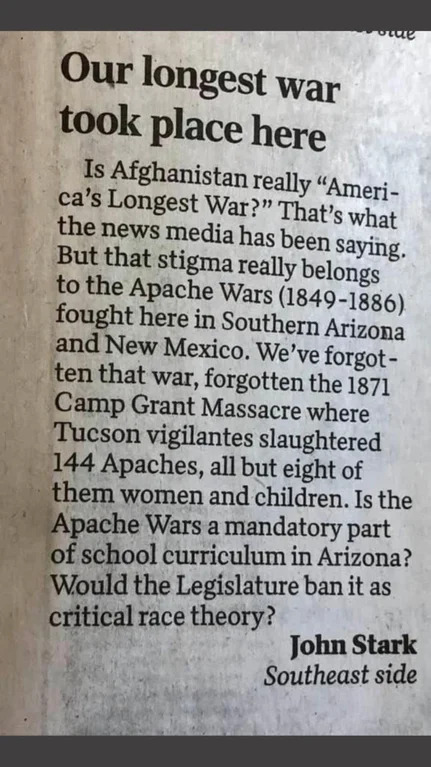
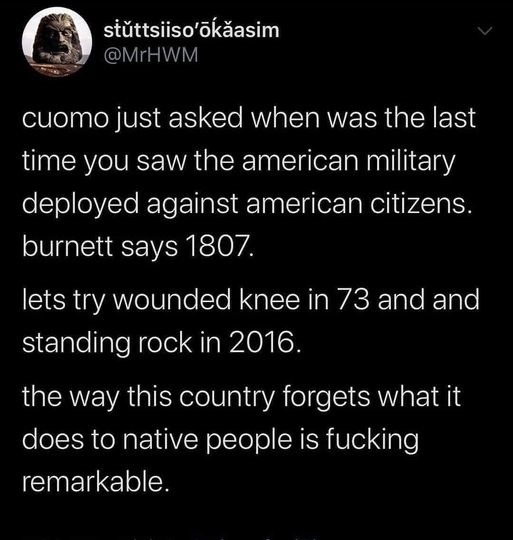
#letter to the editor#newspaper clipping#twitterature#sṫǔttsiiso'ōḱăasim#Native American#war#Wounded Knee#Standing Rock#John Stark
22K notes
·
View notes
Text
this is your daily reminder that it's been over 65 years since cuba overthrew batista's US-backed fascist dictatorship and the US is STILL keeping cuba in extreme poverty using an "embargo."
back in the 1950s, using US funds and US-trained soldiers, batista (not castro) removed most of cubans' rights, including the right to strike, censored all media, and used secret police to torture and publicly excute anyone who protested his dictatorship. In a document released by the CIA in 2005, it stated as many as 20,000 people were killed. In return, batista gave control of most of the arable land to the US. during the revolution, this land was reclaimed and redistributed, which means that USAmericans can now sue anyone who "traffics" in this "confiscated" property.
Despite US sanctions being an "embargo," the US also fines foreign companies for doing business in Cuba, meaning it's effectively a blockade. Despite Obama lightening some of these restrictions, Biden has done little to undo the tightened policies from Trump's administration.
In November, the UN called for the 31st time (!!!) for the US blockade to end, supported by 187 countries and opposed only by the US and its bestest buddy (I'll let you guess who).
Cuba has been in economic crisis for years. Monthly income in Cuba is $30-60. There is very little food and it is hard to purchase anything like toiletries, clothes, and over-the-counter medicines. Domestic production is down because they don't have the resources to sustain them. The US has been intentionally impoverishing and starving Cuba for decades, and they continue to make it clear that it is not going to stop.
So, yeah. US democracy is a joke, end the US blockade on Cuba, and fuck genocide joe.
#the americans arent gonna like this one yall#free cuba#end the US blockade#end the US embargo#hands off cuba#hands off yemen#free palestine#free puerto rico#end US imperialism#stop the US war machine
6K notes
·
View notes
Text
finishing american war felt like having my heart ripped out, stomped on, and shoved back into my chest. the most perfectly bleak ending to a book that so perfectly encapsulates the miserable, pointless, and unending violence of colonialist wars on a burning planet.
1 note
·
View note
Text
I saw this on quora and thought it was cool and wanted to share it on here. Its a long read but crazy. Its from Erik Painter

They did try. And they did capture Navajo men. However, they were unsuccessful in using them to decipher the code. The reason was simple. The Navajo Code was a code that used Navajo. It was not spoken Navajo. To a Navajo speaker, who had not learned the code, a Navajo Code talker sending a message sounds like a string of unconnected Navajo words with no grammar. It was incomprehensible. So, when the Japanese captured a Navajo man named Joe Kieyoomia in the Philippines, he could not really help them even though they tortured him. It was nonsense to him.
The Navajo Code had to be learned and memorized. It was designed to transmit a word by word or letter by letter exact English message. They did not just chat in Navajo. That could have been understood by a Navajo speaker, but more importantly translation is never, ever exact. It would not transmit precise messages. There were about 400 words in the Code.
The first 31 Navajo Marines created the Code with the help of one non-Navajo speaker officer who knew cryptography. The first part of the Code was made to transmit English letters. For each English letter there were three (or sometimes just two) English words that started with that letter and then they were translated into Navajo words. In this way English words could be spelled out with a substitution code. The alternate words were randomly switched around. So, for English B there were the Navajo words for Badger, Bear and Barrel. In Navajo that is: nahashchʼidí, shash, and tóshjeeh. Or the letter A was Red Ant, Axe, or Apple. In Navajo that is: wóláchííʼ, tsénił , or bilasáana. The English letter D was: bįįh=deer, and łééchąąʼí =dog, and chʼįįdii= bad spiritual substance (devil).
For the letter substitution part of the Code the word “bad” could be spelled out a number of ways. To a regular Navajo speaker it would sound like: “Bear, Apple, Dog”. Or other times it could be “ Barrel, Red Ant, Bad Spirit (devil)”. Other times it could be “Badger, Axe, Deer”. As you can see, for just this short English word, “bad” there are many possibilities and to the combination of words used. To a Navajo speaker, all versions are nonsense. It gets worse for a Navajo speaker because normal Navajo conjugates in complex ways (ways an English or Japanese speaker would never dream of). These lists of words have no indicators of how they are connected. It is utterly non-grammatical.
Then to speed it up, and make it even harder to break, they substituted Navajo words for common military words that were often used in short military messages. None were just translations. A few you could figure out. For example, a Lieutenant was “one silver bar” in Navajo. A Major was “Gold Oak Leaf” n Navajo. Other things were less obvious like a Battleship was the word for Whale in Navajo. A Mine Sweeper was the Navajo word for Beaver.
A note here as it seems hard for some people to get this. Navajo is a modern and living language. There are, and were, perfectly useful Navajo words for submarines and battleships and tanks. They did not “make up words because they had no words for modern things”. This is an incorrect story that gets around in the media. There had been Navajo in the military before WWII. The Navajo language is different and perhaps more flexible than English. It is easy to generate new words. They borrow very few words and have words for any modern thing you can imagine. The words for telephone, or train, or nuclear power are all made from Navajo stem roots.
Because the Navajo Marines had memorized the Code there was no code book to capture. There was no machine to capture either. They could transmit it over open radio waves. They could decode it in a few minutes as opposed to the 30 minutes to two hours that other code systems at the time took. And, no Navajo speaker who had not learned the Code could make any sense out of it.
The Japanese had no published texts on Navajo. There was no internationally available description of the language. The Germans had not studied it at the time. The Japanese did suspect it was Navajo. Linguists thought it was in the Athabaskan language family. That would be pretty clear to a linguist. And Navajo had the biggest group of speakers of any Athabaskan language. That is why they tortured Joe Kieyoomia. But, he could not make sense of it. It was just a list of words with no grammar and no meaning.
For Japanese, even writing the language down from the radio broadcasts would be very hard. It has lots of sounds that are not in Japanese or in English. It is hard to tell where some words end or start because the glottal stop is a common consonant. Frequency analysis would have been hard because they did not use a single word for each letter. And some words stood for words instead of for a letter. The task of breaking it was very hard.
Here is an example of a coded message:
béésh łigai naaki joogii gini dibé tsénił áchį́į́h bee ąą ńdítį́hí joogi béésh łóó’ dóó łóóʼtsoh
When translated directly from Navajo into English it is:
“SILVER TWO BLUE JAY CHICKEN HAWK SHEEP AXE NOSE KEY BLUE JAY IRON FISH AND WHALE. “
You can see why a Navajo who did not know the Code would not be able to do much with that. The message above means: “CAPTAIN, THE DIVE BOMBER SANK THE SUBMARINE AND BATTLESHIP.”
“Two silver bars” =captain. Blue jay= the. Chicken hawk= dive bomber. Iron fish = sub. Whale= battleship. “Sheep, Axe Nose Key”=sank. The only normal use of a Navajo word is the word for “and” which is “dóó ”. For the same message the word “sank” would be spelled out another way on a different day. For example, it could be: “snake, apple, needle, kettle”.
Here, below on the video, is a verbal example of how the code sounded. The code sent below sounded to a Navajo speaker who did not know the Code like this: “sheep eyes nose deer destroy tea mouse turkey onion sick horse 362 bear”. To a trained Code Talker, he would write down: “Send demolition team to hill 362 B”. The Navajo Marine Coder Talker then would give it to someone to take the message to the proper person. It only takes a minute or so to code and decode.
youtube
31K notes
·
View notes
Text

This is the kind of free thinking Fascists want to crush.
#history#native american#indigenous#antiauthoritarian#antinazi#anti capitalism#earth#america#australia#australian#amerika#americans#class war#classwar#ausgov#politas#auspol#tasgov#taspol#neoliberal capitalism#fuck neoliberals#anthony albanese#albanese government#antifascist#antifaschistische aktion#anti imperialism#anticapitalista#anti capitalist love notes#eat the rich#anarchy
8K notes
·
View notes
Text
#current events#tel aviv#palestine#gaza#news on gaza#free gaza#news update#palestine news#free palestine#war news#war on gaza#apartheid#settler colonialism#american imperialism#jerusalem#yemen#end the occupation#end the apartheid
4K notes
·
View notes
Text

#free palestine#news#israel#idf#usa#native americans#peta#democrats#republicans#woc#sheep#biden#war crimes
2K notes
·
View notes
Text

#aaron bushnell#palestine#gaza#free palestine#freepalastine🇵🇸#from the river to the sea palestine will be free#current events#human rights#social justice#us politics#usa politics#american politics#west bank#middle east#free gaza#gaza strip#gaza genocide#israel#israeli war crimes#israel occupation#i stand with palestine#i stand with gaza#fuck the usa#fuck the us government#save gaza#stand with gaza#save rafah#free west bank
1K notes
·
View notes
Text
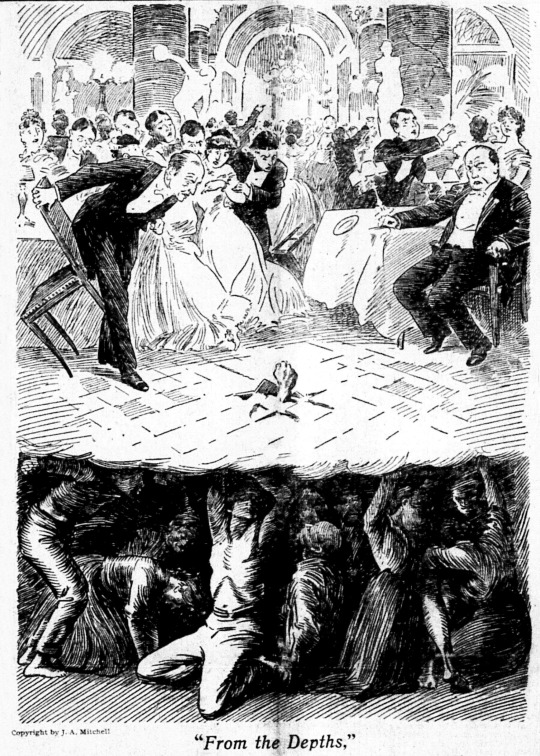
John Ames Mitchell (1845-1918), 'From The Depths', ''Appeal To Reason'', #579, Dec. 29, 1906
#John Ames Mitchell#american artists#appeal to reason#socialism#class war#vintage illustration#vintage art#political art
1K notes
·
View notes
Text
I feel like both internet liberals and leftists have a tendency to reverse-Great Man Theory Ronald Reagan at the expense of any insight into the history of his policies or the conservative movement that led up to him.
#YOU CAN’T JUST BLAME EVERYTHING ON HIM WITHOUT TACITLY ABSOLVING COUNTLESS OTHER MONSTERS AND THE WHOLE FUCKING SYSTEM OF ITS GUILT.#IT’S DEEPLY INDIVIDUALISTIC AND ARGUABLY ANTIHISTORICAL.#Anyway this is because I saw a post that blamed him for the US backing brutal regimes in the global south under the guise of anticommunism.#When that famously started back in the post-WWII era and has its roots in Monroe Doctrine ideology.#FYI I fucking hate him but he’s a part of a larger picture.#(Anyway I study American politics during the Cold War with a focus on the rise of the far right.)#original content#100#500#1k
1K notes
·
View notes